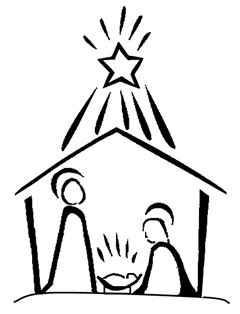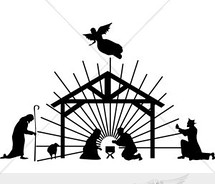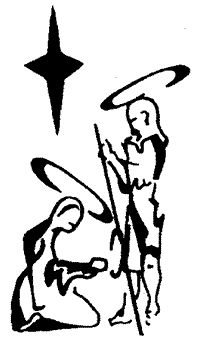"A Child in a Foul Stable /
Where the Beasts Feed and Foam"
For Sunday December 12, 2010
Third Sunday in Advent
Lectionary Readings (Revised Common Lectionary, Year A)
Isaiah 35:1–10
Psalm 146:5–10 or Luke 1:47–55
James 5:7–10
Matthew 11:2–11
A few years ago during Advent my wife noticed one of our co-workers in the church nursery gently crying as she washed her hands at the sink. When she inquired, Susan explained: "You have no idea how painful the holidays are for me. My husband divorced me, and later died. My son was killed by a drunk driver, and my daughter died of cancer. A few weeks before she died, my son-in-law, an attorney, stole all the property that she had intended me to inherit. In fact, as she lay dying, she took great comfort thinking that I would inherit her condo. I am utterly alone in the world."
 |
One week earlier, my wife had spoken to Ella, an attractive, single woman in her forties, an interior designer, who cried while she described her life: "I divorced after five years of marriage, I take Prozac, I'm in weekly therapy, and I hate my job. My boss with his massive ego is so hard to work with."
Sooner or later, writes Craig Barnes in Searching for Home; Spirituality for Restless Souls, trouble "visits every address and comes for a visit." No one gets a free pass. Mental health experts warn us that this can especially be the case during the holidays with its superficial gaiety and heightened expectations. During these difficult times that we all experience, it's all too easy, in the words of Dante's Divine Comedy, to have our vision "clouded by the mists of hell."
I've tried to read the Bible regularly and carefully for thirty-five years, but I must say that I was jolted when I read the Scriptures for this week. In a uniform way they all reveal the essential character of God. All five passages emphasize the people toward whom God is biased. These Scriptures describe at least eighteen — eighteen! — sorts of people in pain who might be forgotten by the world but who are nevertheless remembered by God: the blind, the lame, the diseased, the deaf, the dead, the poor, the dumb, the oppressed, the hungry, the prisoners, the bowed down, foreigners, orphans, widows, the humble, and then, my three favorites, those with feeble hands, weak knees, and fearful hearts.
 |
These Scriptures remind us that the Christmas story is essentially one of a God of tenderness and love who befriends us in the midst of whatever lostness we find ourselves. On that first Christmas night, Jesus was born in a barn and not a palace. The central characters in that drama were all homeless — Mary, Joseph, the shepherds and the wise men. No wonder so many people missed the miracle, and yet as Barnes notes, Christians believe that when God entered our world of darkness and death, "everything between heaven and the chaotic earth was changed forever."
The sacred baby Jesus entered into our secular world, the eternal into the temporal, the heavenly into the mundane. The British writer GK Chesterton (1874–1936) captures this divine descent in his poem "The House of Christmas," and even suggests that God himself was homeless.
There fared a mother driven forth
Out of an inn to roam;
In the place where she was homeless
All men are at home.
The crazy stable close at hand,
With shaking timber and shifting sand,
Grew a stronger thing to abide and stand
Than the square stones of Rome.For men are homesick in their homes,
And strangers under the sun,
And they lay on their heads in a foreign land
Whenever the day is done.
Here we have battle and blazing eyes,
And chance and honour and high surprise,
But our homes are under miraculous skies
Where the yule tale was begun.A Child in a foul stable,
Where the beasts feed and foam;
Only where He was homeless
Are you and I at home;
We have hands that fashion and heads that know,
But our hearts we lost - how long ago!
In a place no chart nor ship can show
Under the sky's dome.This world is wild as an old wives' tale,
And strange the plain things are,
The earth is enough and the air is enough
For our wonder and our war;
But our rest is as far as the fire-drake swings
And our peace is put in impossible things
Where clashed and thundered unthinkable wings
Round an incredible star.To an open house in the evening
Home shall men come,
To an older place than Eden
And a taller town than Rome.
To the end of the way of the wandering star,
To the things that cannot be and that are,
To the place where God was homeless
And all men are at home.
A foul stable with filthy animals, a pregnant and homeless teenager, our wild world. It's in God's own homelessness, says Chesterton, that we discover our own sense of home.
 |
But wait. In the gospel this week John wonders whether Jesus is truly the Coming Deliverer. Jesus tells John to behold the healings of the blind, the lame, the deaf and the dumb, and yet we know what happened to John. He was a man without a miracle who languished in prison before Herod beheaded him. So what, exactly, do the Scriptures promise us?
They don't give us pious platitudes or glib cliches. God is not Santa Claus. Paul contrasts our present sufferings with future glory. In the epistle for this week James urges patience in suffering at least five times. Hebrews honors all those saints who died "without having received what was promised." The baby born in the barn will die a criminal death.
I like how Frederick Buechner puts it. Our experiences of a real but limited deliverance today orient us to a confident expectation of a full redemption in the future. Christians, writes Buechner, are "people who have been delivered just enough to know that there’s more where that came from, and whose experience of that little deliverance that has already happened inside themselves and whose faith in the deliverance still to happen is what sees them through the night."
For further reflection:
* Contrast Chesterton's grim image of a "foul stable" with the many ways we sentimentalize Christmas.
* In what sense do we find our own home in God's homelessness?
* Cf. Chesterton, "our peace is put in impossible things."
Image credits: (1) Flickr.com; (2) VisualizeUs.com; and (3) Nativity of Our Lord Catholic Church.





